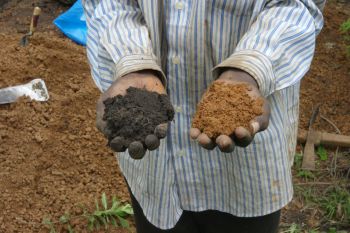Environment & Energy
Related: About this forum700 year-old fertile soil technique could mitigate climate change and revolutionise farming across …
http://www.sussex.ac.uk/newsandevents/pressrelease/id/35929[center]

[font size=1]Photo credit: Victoria Frauisn[/font][/center]
[font size=3]A farming technique practised for centuries by villagers in West Africa, which converts nutrient-poor rainforest soil into fertile farmland, could be the answer to mitigating climate change and revolutionising farming across Africa.
A global study, led by the University of Sussex, which included anthropologists and soil scientists from Cornell, Accra, and Aarhus Universities and the Institute of Development Studies has for the first-time identified and analysed rich fertile soils found in Liberia and Ghana.
They discovered that the ancient West African method of adding charcoal and kitchen waste to highly weathered, nutrient poor, tropical soils can transform the land into enduringly fertile, carbon-rich black soils that the researchers dub ‘African Dark Earths’.
From analysing 150 sites in northwest Liberia and 27 sites in Ghana researchers found that these highly fertile soils contain 200-300 percent more organic carbon than other soils and are capable of supporting far more intensive farming.
…
Thursday, 16 June 2016[/font][/font]
JonathanRackham
(1,604 posts)I wonder if it fixes nitrogen or nitrogen processing bacteria?
When I put the contents of my wood burner or BBQ into the compost pile, the compost mass goes crazy. (Carbon waste + ash).
mopinko
(69,990 posts)not exactly a big secret.
OKIsItJustMe
(19,937 posts)Dr Dawit Solomon, the lead author from Cornell University, said: “What is most surprising is that in both Africa and in Amazonia, these two isolated indigenous communities living far apart in distance and time were able to achieve something that the modern-day agricultural management practices could not achieve until now.
…
stuntcat
(12,022 posts)That means we'll make lots more people! ![]()
![]()
LouisvilleDem
(303 posts)Countries that practice intensive farming the most have the lowest population growth rates.
OnlinePoker
(5,716 posts)Without proper forest management, this could be even more destructive as people would need charcoal not only for their fields, but also as a fuel source. How can they say it will help mitigate climate change when it is helping to dump millions of tons of CO2 and methane into the atmosphere?
mopinko
(69,990 posts)most of the permies use rocket mass stoves.
still, trees.
OKIsItJustMe
(19,937 posts)Encouragingly researchers in the West Africa study were able to live within communities as they created their fertile soils. This enabled them to learn the techniques used by the women from the indigenous communities who disposed of ash, bones and other organic waste to create the African Dark Earths.
…
DinahMoeHum
(21,774 posts)n/t

eppur_se_muova
(36,247 posts)OKIsItJustMe
(19,937 posts)I decided against it… perhaps a poor choice on my part.